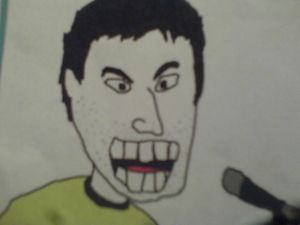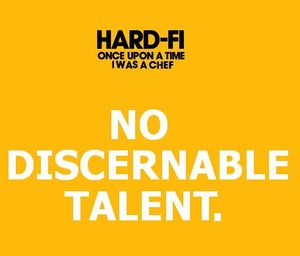Hard-Fi
Hard-Fi are the instigators of a musical revolution of sorts unseen since Beatlemania in the 1960s. They have quite literally re-invented the wheel, replacing it with the far more design friendly triangle, and later the slightly more advanced polygon.
The Revolution[edit | edit source]
Hard Fi are a truly remarkable musical act. For decades previously, artists such as Dylan, Cohen and Morrissey have lyricised inventively about some of the more subtly complex themes common to human beings. Hard Fi are the pioneers of an up-and-coming artistic current that no longer attempt to engage the human brain beyond the drudgery of nine to five office work, but actively embrace it. Several critics have noted their insight, given none of the members are intelligent enough to hold down a job that requires literacy or numeracy, therefore it could be postulated that they were actually performing far beyond their station. Several conspiracy theorists have pointed to evidence that a large proportion of the lyrical content has been derived from graffiti on toilet walls, ideas given a certain amount of credence by a number of their previous hits, including "Want sex? Call Terri on 07722 824853" and "Toilet tennis (look left, look right)" (peaking at #6 and #8 on the UK singles chart respectively).
Debut Album[edit | edit source]
Hard Fi's vandalize first album, "Stars of CCTV" was notable as being the first album ever recorded where the lead singer was unable to sing any of the notes in tune during the entire length of the recording. Fortunately, modern studio techniques were able to acoustically adjust the lead singers tone deaf drawling, meaning the whole world would soon be granted the unmitigated pleasure of hearing Hard Fi on the radio 24/7. It contained such visionary hits as:
Cash Machine[edit | edit source]
A song about frontman Archer's struggle to remember his PIN number when attempting withdraw cash from ATM's. He would often "go to a cash machine|to get a ticket a home". This would subsequently be followed by an on-screen message advising him "not to make plans" because he was broke. HSBC have since denied allegations that their cash machines talk in such colloquial terms to customers approaching the end of their balance. The song eventually taken on something of a prog-rock/sci-fi theme, with Archer controversially ending up being employed by an ATM (the ATM had a substantially higher IQ).
The song later explores themes such as fare-dodging, inability to correctly operate a condom, and continuing employment for a computer program with less AI than Bowser from Mario on the NES. It ends with a 6-minute lament about his poor quality trousers. Sadly he doesn't find time to lament the working conditions of the kids in Uganda on 3p/day that stitched his jeans.
Hard to eat[edit | edit source]
One theory for where the hell this song came from, was Archers cutting edge response to being a sub-standard chef. He would often over-cook joints of beef and lamb for dinner, thus making them "hard to eat". As a result, the meat tasted "like a fist", seemingly originating from "nowhere-ness" (a word to which the English lexicon is ever grateful for its inclusion, no doubt) and not New Zealand as it said on the packet. The song ends with our protagonist watching repeats of Delia Smith, saying "Oh yeah, girl, you've got something I like..."
Another theory is that Hard Fi were called Hard Pi when this song was written, after a pie that Archer had baked and had broke his jaw on. Archer then realised that he would look like a complete twat if his band was called 'Hard Pi' so changed it to Hard Fi...whatever the hell that means.
Living for the weekend[edit | edit source]
A song so incredibly bad that no amount of satire could possibly explain just how much of a musical travesty it really is. He's been at work. He's just got paid (revisiting the prog-themed ATM episode from earlier in the album), he "runs down the street with adidas on his feet". Controversially, several reviews recommended budding songwriters either give up or commit suicide, because nothing they could ever write would even possibly come close to the undeniable lyrical genius of these words. Not since "Hot Shot City on a Saturday night" has the world been treated to words of such profundity. NME took it one stage further by recommending frequent masturbation whilst listening to Hard Fi, because it was That Good.
Once Upon A Time I Was A Chef[edit | edit source]
Hard Fi's second album. It has the SHITTEST album artwork EVER.
Suburban Knights[edit | edit source]
Perhaps not feeling the title of their first album encapsulated the feeling that one had just encountered an aural equivalent of steaming rat shit, their second album is entitled with a view to making themselves sound like an even bigger shower of twats than was originally thought possible. It went straight in at #1, proof if ever it was needed that there really are a lot of people with really, really bad taste willing to part with their hard earned cash out there.
The single of the same name continues some of the themes of the first album (endless middle class struggle against bills, sob) juxtaposed against the more abstract theme of the war on terror. British people commonly justify their lack of knowledge regarding world affairs because they are too busy spending 5 seconds filing away another unopened credit card bill.
The Good News for everyone[edit | edit source]
You don't need to be able to sing, write lyrics with any kind of meaning, or compose any sort of interesting music or melody to be a superstar. The efforts of this truly talentless troupe of drifters continue to give hope to the millions of even slightly more musically talented people in the world that all things are possible, and that maybe its better to be unknown and good than well-known and uncategorically the worst so called "band" to grace the planet this decade.


